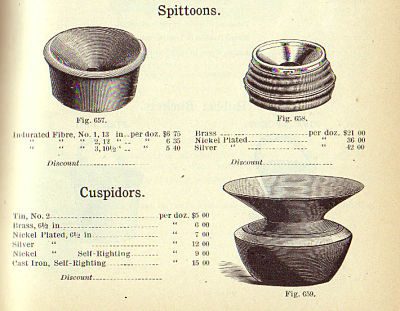 My Mother likes to tell us about the noble effort of the town of Clendenin, West Virginia, to stop spitting outside the Smoke Shop. They put up a sign that said: “Do Not Expectorate,” since a sign that said: “Do Not Spit” would have been vulgar. Needless to say, those old boys at the Smoke Shop would lean on the sign spitting. Do not be confused: they knew. Mountaineers are always free . . . as the state motto says.
My Mother likes to tell us about the noble effort of the town of Clendenin, West Virginia, to stop spitting outside the Smoke Shop. They put up a sign that said: “Do Not Expectorate,” since a sign that said: “Do Not Spit” would have been vulgar. Needless to say, those old boys at the Smoke Shop would lean on the sign spitting. Do not be confused: they knew. Mountaineers are always free . . . as the state motto says.
There was a lesson for me in this: government can be a busy body, is often ineffectual, and a little rebellion against prissy rules is good for the soul. Naturally, chewing tobacco is not good for you and spitting on the sidewalk is nasty . . . but the sign was absurd.
Government should never confuse vulgarity with immorality or immorality with what should be illegal. Social norms change over time and from area to area. What is impolite in one place (belching) may be required in another. Safe to say, nobody was ever damned for getting confused about social norms. Perhaps we should not be rude, but rudeness is not the same as sinfulness.
This mistake would not matter if confusion between being a good Houstonian, or American, or Packer fan did not get confused with being a good person. Since social norms obviously change from place to place, some of my students think morality must be subjective (relative). Because “chew with your mouth shut” is not good advice in every culture, we might think that any general prohibition (“do not murder”) might not apply to all humankind. When we put good party manners on the same par with the laws of Nature and of Nature’s God, we make both absurd. Manners will not stand the seriousness of morality and so we often ignore good manners when we should not. The laws of morality should never be compared with something as trivial as table manners.
I started thinking about this while preparing for a Republic session for the college at The Saint Constantine School. The insufferable big-headed host of the discussion is Cephalous (!) and one of the miracles of the dialog is that he leaves before he kills the discussion with his folk wisdom. Nobody wants to grow up to be Cephalous any more than a man should aspire to be Polonius in Hamlet (“To thine own self be true!).
Whenever an insufferable character gives what sounds like “good” advice, beware. The clever author is tipping you off that things are not as good as they appear. When Polonius says “be true to your self” . . . we are reminded that what we think is “self” is often a crazy mix of social ideas and our own fatuous desires. By all means, be true to self, but first know thyself!
Socrates asks Cephalous how to be a good older man and Cephalous says that his friends have made an important mistake. They spend most of their time complaining about what they cannot do anymore. They are miserable, but ” . . . the real cause is not old age, Socrates, but the way people live.” This seems true enough, but if one reads on, then one sees Cephalous dispensing advice on how to be a good Athenian. It might have been good advice for how to live a “normal Athenian” life, but it is not going to make a man good and, as the Republic proceeds to demonstrate, only a good man can be happy. Some of his advice is just bad. He is glad he has money in old age so he can buy off the gods with many sacrifices. This is the equivalent of the mafia don who thinks he can buy off God by building a cathedral. We will be thankful for the cathedral, but God is not fooled.
Cephalous thinks that if he has paid his debts to Athens, then he has been a good man. This is like believing that if one of the good old boys in West Virginia had not expectorated, then he might make it to paradise. That is a mistake, a bad one: justice is not found in spitting or not spitting. John the Baptist suggests that some rough men will be in the Kingdom and Samson proves it. Samson was horrible at a party.
In all probability, there will be those in the Kingdom who stood under a “do not expectorate” sign and spat.
We see that a Polonius or a Cephalous can fool us by giving us a right conclusion (live a good life to be happy) that hides a bad understanding of what it is to be: good, happy, or even alive! We must live well now to be happy, but living well may include being a “bad” American, a difficult Houstonian, or even being rude.
Don’t chew, it’s bad for you, don’t spit on the sidewalk, it’s bad for us, but if you do, then God still loves you!











